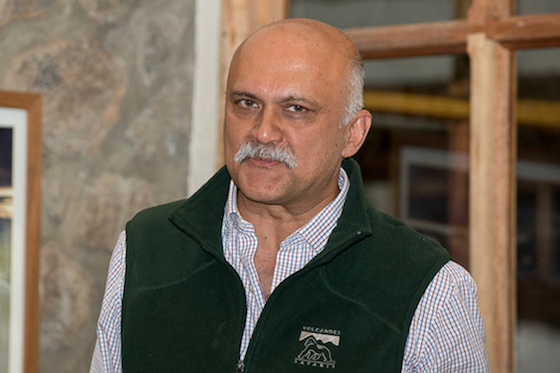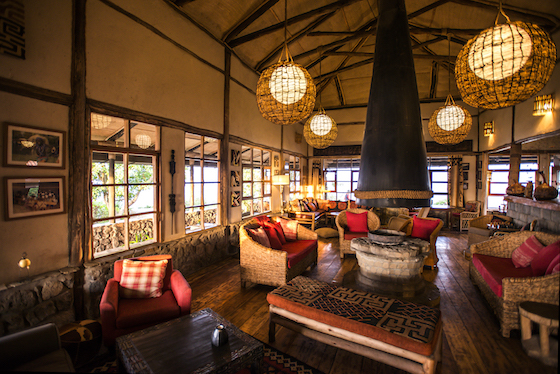At a time in our competitive industry when outside-the-box thinking is all but a requirement, the professionals featured by HOTELS can inspire you to think differently. This week, it’s Praveen Moman, founder of Volcanoes Safaris, who is bringing the southern Africa ideal of hospitality to luxury lodges in Uganda and Rwanda. Last week: Landis Smithers, chief creative officer at Standard International and a hospitality newbie with big ideas. Stay tuned each week for another profile of a hotelier challenging the status quo — they’re all featured in HOTELS People Issue, publishing this month.

Travel means kinship with humanity, according to 14th century Moroccan traveler Ibn Battuta, and Praveen Moman, founder of Volcanoes Safaris, roots his philosophy about ecotourism, hospitality and luxury in this thought.
Battuta’s tenet and the southern African concept of “ubuntu,” or sharing to connect with others, are at the heart of the experience at Volcanoes Safaris, Moman says, which has luxury lodges intimately nestled in pristine wilderness in Rwanda and Uganda.
Contributed by Debbie Carlson
“It’s not just about the material and comfort. It’s what touches your humanity,” the 63-year-old hotelier says.
Rwanda may be a hot spot for tourism now, but the country was ripped apart by a bloody civil war that ended in 1995. In the 23 years since, the country has rebuilt and now has a thriving economy, in large part due to tourism. Moman witnessed Rwanda’s transformation, opening Virunga Lodge in 2004, near Volcanoes National Park in the Virunga mountains, home of the mountain gorilla. It was the first international company to enter Rwanda after the war.
Born and raised in Uganda, Moman’s family fled to the United Kingdom amid the expulsion of South Asians by Idi Amin in 1972. Eventually, he worked in foreign affairs and development for the European Parliament, coincidently returning to Africa. Uganda had suffered its own civil war but began to rebuild and stabilize in the late 1990s.

Moman, looking for a career change, returned to Uganda. He was drawn to the “very special and very beautiful” Virunga mountains, covering parts of Uganda, Rwanda and the Democratic Republic of Congo. In the 1960s it was a major niche tourism destination, drawing visitors like Ernest Hemingway and Bob Hope. Dian Fossey studied primates in Rwanda’s Volcanoes National Park.
Moman says he thought if he could help preserve the area’s biodiversity it could rekindle tourism decimated by the war. In 1997 in Uganda, Volcanoes Safaris was born. It wasn’t easy: Day trips to view gorillas in Rwanda required military escorts. Seeing the war’s devastation deeply affected him.
“That was quite a tough and difficult time personally to watch all these people suffer, and it was quite contradictory to think about tourism. But I kept thinking, one day the tourism would help make sure that there was some economic contribution to the country,” he says.
Luxury in context
Now Volcanoes Safaris’ Virunga Lodge in Rwanda, the company’s flagship location, is considered a premier African luxury destination. The company has three smaller lodges in Uganda, in areas that reflect that region’s biodiversity. The lodges use local materials and culturally appropriate designs with amenities that cater to an international traveler.
“We want to provide (guests) luxury and comfort, style and elegance, but is rooted in its context. That’s the aesthetic journey we tried to make… You don’t just build a Western-style hotel that is not connected to the area,” Moman says. Volcanoes Safaris’ guests can book safaris of up to seven days for a separate fee.
Moman considers the mountain gorilla the icon of African wildlife not only because of its fragility — only about 900 exist — but because of how similar they are to humans. “When you’re seeing a gorilla, there’s this immediate bond on both sides,” he says. “When a gorilla looks at you, the gorilla kind of thinks, ‘wait a minute, don’t I know you?'”
Trevor Ward, head of consultancy services for W Hospitality Group and Hotel Partners Africa, says although he does not know the specifics of Moman’s business, Volcanoes Safaris likely has a niche carved out, as safari has never lost it allure. “Safari is an experience a huge number of people have not done, and even if you have done it, there are different types,” says Ward, who calls Rwanda, with its ample hotel rooms and ease of access, “Africa light.” The country’s image now, he says, is “that it’s the Switzerland of Africa – the mountains, the cleanness, the orderliness of it.”
Safaris include options to interact with local?people such as visiting schools and the for guests to fund projects around each lodge; one project is helping to build a permanent settlement near Uganda’s Mount Gahinga Lodge for the Batwa people displaced when the national park was created.
“Local people can only support these species if they get benefit out of them,” Moman says.
Connection — whether it’s to the wildlife or the people — is the essence of the experience. “The essence of luxury is to be involved and included and taken into somebody’s home in this area and be pampered and looked after,” he says, later adding, “to share people’s lives is a rare joy.”
Long-term plans include expanding in the DRC, he says. Although Moman did not disclose revenue data, he says over the past five years he has been able to focus on more of the community and conservation efforts. “Now for the last five years we have a steady eddy business that can look after itself.”
